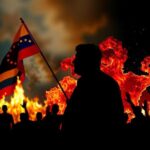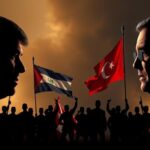Discourse on September 11, Political Debates, and Recent Tragedies in America
Summary
The article addresses the resurgence of false claims about the September 11 attacks, President Biden’s response to a shooting in the West Bank, a mother’s defense of her son accused of a violent crime, the arrest of a wildfire suspect, underestimating a young mass shooter, swing state voter reactions to the Harris-Trump debate, the passing of musician Frankie Beverly, and the overall implications of these events on public discourse and electoral dynamics.
The ongoing discourse surrounding the events of September 11 has been punctuated by the propagation of various erroneous claims. Recently, these claims have resurfaced, prompting officials and experts alike to clarify the historical facts and combat misinformation that persists in public narratives. Concurrently, President Biden expressed his outrage following the tragic shooting of an American citizen in the West Bank, highlighting the complexities of international relations and security concerns that arise from such incidents. In Georgia, the mother of a suspect involved in a heinous crime wrote an apology letter, asserting that her son is not a monster, which has generated significant media attention and discussions on parental responsibility in regard to violent behaviors. Authorities also reported the capture of an individual believed to be responsible for igniting the Line Wildfire, an incident that had devastating effects on local ecosystems and communities. In a reflective analysis of recent events, it has come to light that law enforcement agencies previously underestimated one of the youngest mass shooters, raising questions about the efficacy of threat assessment protocols. In the context of political engagement, voters in critical swing states have shared their perspectives on the recent debate between Vice President Kamala Harris and former President Donald Trump, which displayed a vigorous exchange of ideas, including key moments that shaped public opinion. Among the notable cultural impacts, the passing of Frankie Beverly, renowned for his contributions to music with the group Maze, is mourned by fans as he left a legacy characterized by his famous song ‘Before I Let Go.’ The aforementioned debate has been a focal point of analysis, with a careful examination of the candidates’ statements—both accurate and inaccurate—emerging as crucial in determining the authenticity of their appeals to the electorate. The encounter started amiably with a handshake but quickly escalated into an intense exchange of criticisms and counterarguments. Observers noted that Vice President Harris landed a significant blow against Trump, which may influence public sentiment moving forward.
In recent weeks, the dissemination of false information regarding pivotal historical events, particularly the September 11 attacks, has sparked considerable concern among scholars and the public. This misinformation threatens to undermine the collective memory and factual understanding of these significant events in American history. Furthermore, ongoing incidents in global contexts, such as the violence occurring in the West Bank, underscore the intricate interplay of international relations and the ramifications that arise from individual acts of violence. Across the United States, criminal acts and shootings continue to provoke critical discussions about gun control, mental health, and societal values, which are reflected in both media portrayals and public discourse. Additionally, electoral dynamics are being closely monitored as upcoming debates and voter sentiments shape the political landscape ahead of future elections.
In conclusion, the intersection of historical facts, political discourse, societal issues, and cultural losses has created a complicated narrative in contemporary America. The need for clear communication and truth in political dialogues is juxtaposed with the emotional responses elicited by recent tragedies and cultural milestones. This situation necessitates continued vigilance against misinformation while fostering robust discussions regarding community safety, the significance of historical memory, and the direction of national policy discussions as the election cycle progresses.
Original Source: www.usatoday.com








Post Comment